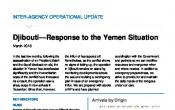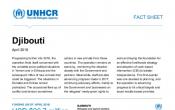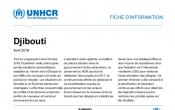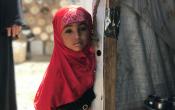Djibouti
Operation: Djibouti
Location
{"longitude":42,"latitude":12,"zoom_level":7,"iso_codes":"'DJI'"}
By clicking on the icons on the map, additional information is displayed.
Key Figures
| 2017 year-end results | |
| 3,900 | refugee children were enrolled in primary education |
| 530 | Somali refugees were assisted to voluntarily return to Somalia |
| 54 | refugees (39 Somalis and 15 Eritreans) were resettled to Canada and the United States of America |
| 2018 planning figures | |
| 100% | of eligible refugee children will have their birth certificates delivered, which will enable access to national social services |
| 38,100 | people of concern will benefit from dissemination and awareness raising on the fundamental rights of refugees and access to national social services |
| 4,000 | refugee students will benefit from joint efforts of UNHCR and MENFOP (Ministry of Education) to ensure effective inclusion of refugees into the national education system |
| 1,000 | refugees, in particular from Somalia, will be facilitated for their return |
Latest Updates and Related Links
People of Concern
18%
Increase in
2016
2016
| 2016 | 25,862 |
| 2015 | 22,006 |
| 2014 | 24,362 |

[["Refugees",17683],["Asylum-seekers",8061],["Others of concern",118]]
Loading ...
Djibouti
< Back
2017
{"categories":[2013,2014,2015,2016,2017,2018],"budget":[26.23853782,26.95790235,41.39620267,31.98783036,31.80505653,26.7309307],"expenditure":[7.57613705,7.38017953,10.5087068,11.1475553,12.07126509,null]}
{"categories":[2013,2014,2015,2016,2017,2018],"p1":[26.23853782,26.95790235,41.39620267,31.98783036,31.80505653,26.7309307],"p2":[null,null,null,null,null,null],"p3":[null,null,null,null,null,null],"p4":[null,null,null,null,null,null]}
{"categories":[2013,2014,2015,2016,2017,2018],"p1":[7.57613705,7.38017953,10.5087068,11.1475553,12.07126509,null],"p2":[null,null,null,null,null,null],"p3":[null,null,null,null,null,null],"p4":[null,null,null,null,null,null]}
Loading ...
CHOOSE A YEAR
- 2015
- 2016
- 2017
- 2018
Operational context
Djibouti has been hosting refugees for over four decades. With 23 per cent of the population living in extreme poverty, the country relies heavily on foreign direct investments, rents from foreign countries’ military bases and port services. Furthermore, the long-lasting drought that has persisted since 2008 has led to an increased vulnerability of the population including that of people of concern.Despite the challenging economic environment, including limited funding and human resources, UNHCR provided protection and basic assistance to people of concern, while strongly supporting and advocating the Government in adopting and implementing the Comprehensive Refugee Response Framework (CRRF), which aims at enhancing refugee self-reliance and inclusion, alongside providing more support for host communities among others. In 2017, UNHCR also laid out its Multi-Year Multi-Partner strategy, which aims to achieve long-lasting and durable solutions for refugees through expanding partnership networks and resources.
In December 2017, Djibouti hosted the Inter-governmental Authority on Development (IGAD) Regional Education Conference, which resulted in the Djibouti Declaration on Regional Refugee Education as well as the Djibouti Plan of Action on Refugee Education in IGAD member states.
Population trends
In 2017, Djibouti hosted close to 27,000 refugees, originating mostly from Somalia (48 per cent) and Ethiopia (34 per cent), with a smaller number of other nationalities. Women and children accounted for 73 per cent of the refugee population. The vast majority, 81 per cent, of refugees live across the three settlements (Ali Addeh, Holl Holl and Markazi) and are entirely dependent on humanitarian assistance. The remaining 19 per cent of the refugee population (mostly Yemenis) reside in urban areas.In the suburbs of Djibouti City, the population of concern—estimated at 120,000 people by the Government—fluctuates as a result of mixed movements. Yemenis and Eritreans continued to arrive, though in modest numbers.
Key achievements
The 2017 was a year of progress in terms of critical and tangible support from the Government on refugee rights including integration into the national systems. The National Refugee Law was promulgated and two decrees were passed, giving refugees access to socio-economic integration i.e. access to social services (healthcare, education) and employment opportunities.In December 2017, Djibouti hosted a regional conference on improving education for refugees in alignment with CRRF. This development followed an agreement between the Government and UNHCR in August 2017 on provision of quality education to all refugee children by including them into the national system. As a result, Ethiopian, Eritrean and Somali refugees in the Holl-Holl and Ali Addeh settlements now follow the national curriculum in English, while the Yemeni refugees in the Markazi settlement follow the Yemeni curriculum.
Unmet needs
Limited funding and human resources did not allow for a comprehensive response, identification and development of sustainable solutions for refugees and asylum-seekers in Djibouti. As a result, the operation focused on provision of protection and basic assistance, while following needs still remained unmet:- Registration through biometric identity management system in Djibouti City;
- implementation of durable shelter strategy (only 6% of refugees in Ali Addeh and Holl Holl settlements live in adequate shelters);
- adequate number of classrooms and child-friendly spaces;
- secondary school in Holl Holl;
- special education for refugee children with disabilities in urban areas;
- vocational training and income-generating activities.
Working environment
In Djibouti, some 37 per cent of the population lives below the poverty line and unemployment levels are at up to 60 per cent, depending on the region. In this difficult environment, Djibouti hosts over 24,000 refugees, primarily Somalis and Yemenis, but also other nationalities including Eritreans and Ethiopians.Given the lack of resources in the country, refugees depend solely on humanitarian aid. Access to farmland and drinking water remain major issues of concern. The Kenyan education curriculum (English) used in camp schools is not recognized by the Government of Djibouti nor that of Somalia. In public hospitals refugees are not considered as “vulnerable”; as a result refugees’ medical fees must be fully covered by UNHCR. Refugee status determination (RSD) procedures require strengthening to ensure sustainable processing of asylum claims.
Key priorities
In 2017, UNHCR operation in Djibouti will focus on: • Continuing life-saving interventions, with an emphasis on health/nutrition, shelter, education, prevention and response to SGBV, water management, and services for those with specific needs;
• advocating for the inclusion of refugees in national education and health systems:
• advocating the adoption and implementation of a national law on refugees;
• promoting durable solutions, including voluntary repatriation, resettlement and local integration;
• Strengthening the capacity of government mechanisms for refugee status determination (RSD); and
• encouraging the Government of Djibouti to engage further in the Khartoum process to address the root causes and ensure adequate management of mixed migration





